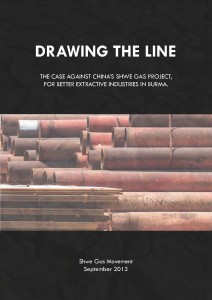Drawing The Line: The Case Against China’s Shwe Gas Project, For Better Extractive Industries in Burma
By Shwe Gas Movement • September 30, 2013 The Shwe Gas project, the largest extractive project in Burma, set to earn US$54 billion for the Burmese government, has just begun transferring Burma’s natural gas to China. As the first such project to become operational under the new quasi-civilian government, its management will set the precedent for how future extractive projects will be carried out as Burma opens up for investment and resource bidding. As it stands, the standard is not good.
The Shwe Gas project, the largest extractive project in Burma, set to earn US$54 billion for the Burmese government, has just begun transferring Burma’s natural gas to China. As the first such project to become operational under the new quasi-civilian government, its management will set the precedent for how future extractive projects will be carried out as Burma opens up for investment and resource bidding. As it stands, the standard is not good.
The Shwe Gas project refers to a number of related developments reaching from Burma’s Arakan coast to Kunming and Nanning, China. The major components of the project are offshore natural gas rigs, an onshore natural gas terminal, a deep sea port, a crude oil storage facility, and two pipelines that span Burma diagonally, delivering gas and oil directly to Southwestern China. The project has effectively enabled others, such as the development of a Special Economic Zone and a transnational railway linking Burma’s western coast to China.
Given that Burma’s transition from military dictatorship to a quasi-civilian government is still in an early and precarious stage, some of the abuses associated with this project are ongoing, and new problems have emerged. The primary direct consequences of the Shwe Gas project are land confiscation, labor abuse, loss of livelihoods and environmental degradation. In northern Shan state, these core problems have reignited frequent conflict between the Burma Army and four separate ethnic armies, which will continue intermittently unless these core problems are addressed in a political settlement.
Land reform laws passed in 2012 have failed to protect the rights of smallhold farmers, leaving them even more vulnerable to unfair acquisition than before and providing no effective system of recourse. Laws governing fiscal transparency and environmental responsibility are virtually non-existent (our recent briefer “Good Governance and the Extractive Industry in Burma” provides an analysis of the current regulatory framework, or lack thereof).
Furthermore, Burma has retained legislation that prohibits dissent; the Peaceful Assembly and Peaceful Procession Law, Unlawful Association Act and several restrictive media laws continue to silence local voices in the face of corporate misconduct.
But beyond failures of national legislation lies a more fundamental problem: the constitutional denial of states’ local authority over resources precludes fair distribution and development. The profits of the Shwe Gas project are set to go straight to the Union government – bypassing some of Burma’s poorest communities – with no requirement of revenue transparency. Without establishing a true federalist system providing authority to ethnic states and regions, communities will not be satisfied with the implementation of new national measures, hence conflicts and civil wars will remain unresolved.
Now the Shwe Gas project is going into operation, as other similar developments are readying to do the same. Other projects – the hydropower dams on the Salween and Irrawaddy rivers, the Latpadaung copper mines, and the development of Special Economic Zones all over the country, to name a few – are forging ahead without protective measures. The people of Burma must decide: will we accept the existing standard of abuse by foreign investors without any re-assessment, safeguards, or benefits for local people?
Investors are clambering at our door. They want our resources. The Shwe Gas project can set the precedent for how similar developments are implemented and governed. We must stand up now to demand that operations be postponed until an acceptable standard is created to safeguard communities and ensure equitable distribution of both resources and revenue.
Download the report in English or Burmese here.
Tags: Environment, Forced Labor, Human Rights Violations, Land Confiscation, Shwe Gas Movement, Shwe Gas Project, Special Economic ZoneThis post is in: Business and Human Rights, Spotlight
Related Posts၈၈ မ်ဳိးဆက္ ၿငိမ္းခ်မ္းေရးႏွင့္ ပြင့္လင္းလူ႔အဖြဲ႔အစည္း (လယ္ယာစီးပြားႏွင့္ ေတာင္သူလယ္သမား ေရးရာဌာန) အမ်ဳိးသားေျမ အသုံးခ်မႈ မူ၀ါဒ (မူၾကမ္း)ႏွင့္ ပတ္သက္၍ သေဘာထား ထုတ္ျပန္ခ်က္
Afraid to Go Home: Recent Violent Conflict and Human Rights Abuses in Karen State
New Report Documents Recent Violent Conflict in Karen State
New National Land Use Policy Must Reflect the Concerns of those Affected
Karen Civil Society Rallies Around Japan’s Harmful Plans for Eastern Burma









 All posts
All posts